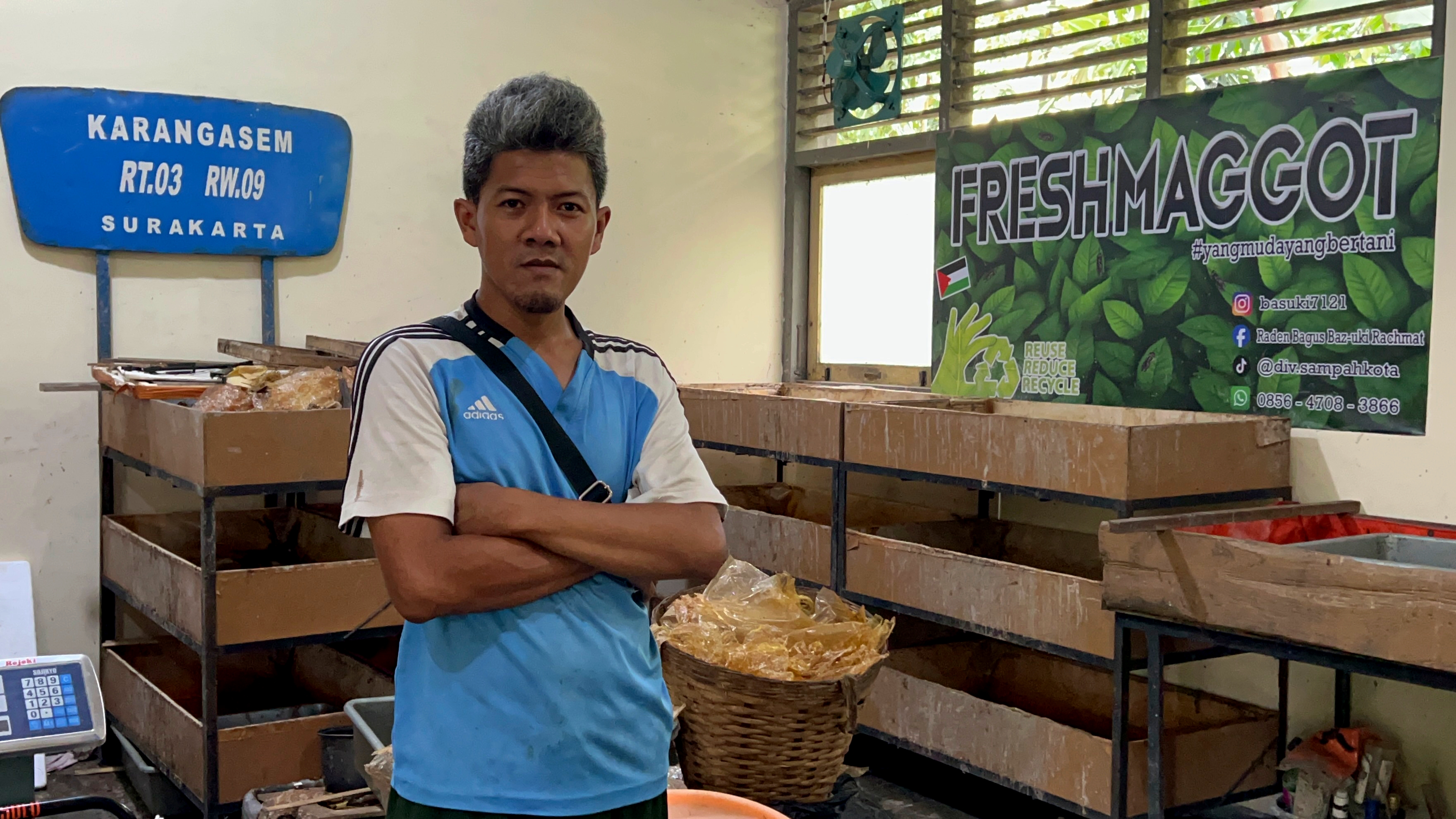It was late in the evening when Basuki arrived at the old, abandoned school building that had now become the heart of his maggot farming operation. The building, once filled with the lively sounds of children, now stood quiet and still, but inside, rows of wooden bins stacked three levels high lined the walls. A pungent smell of rotting food filled the room—a scent that might turn away most visitors, but for Basuki, it had long become a familiar part of his daily routine.

With practiced hands, Basuki checked one of the bins, observing the thousands of black soldier fly larvae wriggling and feeding on the food waste. He carefully removed dried pieces of plastic that had mixed with the waste, tossing them into a nearby trash bin. Then, he pulled out his phone and opened TikTok, preparing for another live stream to explain the process of maggot farming to his thousands of followers.
On TikTok, Basuki didn’t just share tips on maggot farming; he also inspired his audience by showing how food waste could be transformed into affordable, high-quality animal feed.


Basuki’s journey into the world of maggot farming began after the Covid-19 pandemic changed his life. Losing his job in the city, he returned to his hometown in Surakarta to find new ways to support his family. There, he joined the Gajah Putih Waste Bank, a local community initiative focused on waste management, and realized that organic waste, especially kitchen scraps, wasn’t being properly managed.
It was during this time that Basuki came across a maggot farming training session organized by Gita Pertiwi, a partner of Rikolto in Surakarta. Intrigued by the idea, he saw an opportunity to not only reduce food waste but also produce affordable livestock feed.

Maggots take only 18 days from eggs to harvest, and their production cycle is fast. Properly sorted kitchen waste is excellent for feeding the maggots. Considering the large amounts of waste generated by hotels, restaurants, and catering services, the question is: how can we manage it well so it doesn’t end up in landfills?
With an initial investment of IDR 3 million, Basuki bought plastic bins, 20 grams of fly eggs, and built a fly enclosure to increase egg production. Over the first few production cycles, Basuki focused on growing the maggot population, and soon he was able to produce hundreds of kilograms of maggots every month.
He also expanded into farming chickens, ducks, and catfish, using 75% maggots as animal feed. This strategy significantly reduced production costs and boosted profits from selling poultry to local farmers. Today, Basuki earns an average of IDR 3-4 million a month, enough to support his family.



Basuki’s success was not without support. He received training and guidance from Rikolto and Gita Pertiwi, both of whom saw the potential of maggot farming to reduce food waste and provide financial benefits.
He learned firsthand through the demo plot for maggot farming set up by Rikolto in 2021 at Mini Edu Park Taman Winasis, managed by the Surakarta Department of Agriculture and Food Security. The site manager, Wiyono, along with Gita Pertiwi and Rikolto, worked together to develop Standard Operating Procedures (SOPs) to help farmers like Basuki run their maggot farms more effectively.

Basuki also collaborated with local catering services and event venues to collect leftover food from weddings and other events. Thanks to the support of Rikolto and Gita Pertiwi, he secured access to organic waste from a major hotel in Surakarta, which provided about three tons of food waste each month, ensuring a steady supply of food for his maggots.
To increase sales, Basuki turned to TikTok, using the platform to showcase his maggot farming techniques and educate his audience. His live streams have not only increased interest in maggot farming but have also led local viewers to purchase maggots for use as fishing bait or livestock feed. Some viewers even buy maggot eggs to start their own farms.

Maggot farming offers a promising solution, benefiting both the environment and farmers. By reducing food waste and offering an alternative to conventional livestock feed, maggot farming provides a cost-effective and sustainable solution.
However, the availability of consistent, properly sorted kitchen waste remains a major challenge. Mixed waste often requires costly and time-consuming manual sorting before it can be used for feeding the maggots.
Rikolto and Gita Pertiwi continue to advocate for better waste management practices to ensure that food waste can be effectively processed and reused.
Despite the challenges, Basuki remains optimistic. With his creativity and persistence, he has turned waste into profit and transformed a crisis into an opportunity. Through his TikTok live streams, Basuki continues to inspire thousands, proving that the circular economy is not just a theory but a reality that can be achieved.

Properly sorted waste not only reduces the burden on landfills but also opens up possibilities for profitable waste processing, like maggot farming, which offers a sustainable environmental solution. Consistent waste sorting at all levels of waste management is key to the success of this circular economy.